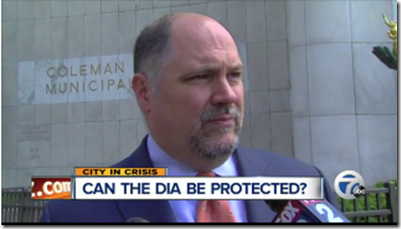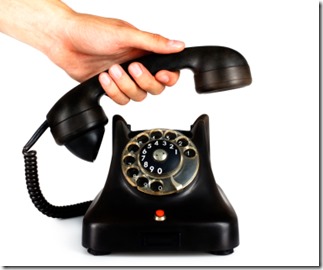Dear Media: Don’t Call Me. And Don’t Leave Me Voice Mails.
Bill Nowling, the spokesperson for Detroit’s emergency manager, sent reporters a memo recently instructing them to stop leaving him voice mails. JimRomenesko.com has the full text; an excerpt appears below:
To better assist you and your organization with media questions and interview requests, I am instituting a new “contact procedure” that I think will streamline the process and get you the information you need in a timely fashion…
1. Going forward, all media requests (for information, for interviews, for directions) will be handled via e-mail at: EMMediarequest@detroitmi.gov.
2. If you have a media question, please send an email to: EMMediarequest@detroitmi.gov. Please be as detailed as possible as to the issue about which you are calling or the specific questions you have. Also include a specific deadline for responding back.
3. Please don’t leave a voice mail message. Believe it or not, VM just adds delay in responding, especially when most messages simply say “call me back.” It is not unusual for me to have 25 or more VMs waiting to be heard at any given time.
You might expect me to blast Mr. Nowling. The truth is, I’m empathetic.
Like him, I find telephone voice mails to be the least efficient way to reach me. I respond to emails and tweets much more quickly, and occasionally forget to check my voice mail when I’m out of town. Plus, he’s right – a simple “can you give me a call” voice mail message can be more efficiently delivered via email, text, or tweet.
The biggest problem with his new policy may not be the policy itself, but the manner in which he communicated it. As an example, here’s a comment Nowling left on the website Deadline Detroit:
“I hate VM. It’s impersonal, inefficient and it fills up two or three times a day…I want to talk to reporters, but I don’t want to waste their time or mine by not being prepared; if I can cut one just one extra return call for each call that comes by being prepared to answer the question when I call back, then I will be able to handle more media calls in a day.”
In his full one-paragraph comment on that website, he used the words “my,” “mine” or “I” a whopping 17 times, showing just how self-centered his message was.
Imagine if he had framed his message as a request rather than a formal procedure instead:
“In order to serve your audience, you deserve the fastest-possible response time from me. Because I’m not always in the office, I’m afraid that voice mails don’t always get played as quickly as they should (plus, the voice mail box fills up quickly, preventing some of you from leaving messages). Therefore, in an effort to serve you better, please email your requests to me. In return, I promise to be responsive to your emails in a timely manner. And if you opt to leave a voice mail message, I’ll do my best to listen to it quickly—but please know that’s not always possible and it’s proven to be a much less efficient way to reach me.”
That framing makes it less about him (“I hate VM”) and more about serving the media and the public (“You deserve the fastest-possible response time from me.”)
Of course, that only works if he follows through. One anonymous commenter identifying himself as a reporter on PR Newser writes:
“This would be perfectly reasonable IF Nowling responded to e-mails, which he rarely does. At one point he wanted to communicate by text message, which is insane. And let’s be clear: this isn’t some corporate flack we are talking about. He is essentially the press secretary for the city of Detroit, which is seeking bankruptcy protection under federal law. He is a public servant, and should be responding to the public–and the media–accordingly. In other words, he has no right to be arrogant.”
I have reservations about Mr. Nowling’s policy and am not sure it builds the positive press relations that anyone in a public position should desire. Perhaps he could have made clear that he doesn’t mind people trying to reach him by phone—reporters have the right to contact him using their preferred method, too—but that if he doesn’t pick up, email might be the next-fastest option.
What do you think? Does a public servant have a right to instill a “no voice mail” policy? Please leave your thoughts in the comments section below.





[…] Mr. Media Training: Dear Media: Don’t Call Me and Don’t Leave Me Voice Mails […]
Wow, this is a tough one. I certainly empathize with this guy; I can’t stand voice mail either. The messages that just say “call me back” are certainly not helpful, and it’s frustrating to have to tell a reporter that you’ve got to look into their question and call them back if you don’t have the info on-hand.
But, while I think his reasoning behind the new policy is laudable, I think it’s ultimately counter-productive.
So much of your success as a PR person hinges on being able to develop positive relationships with a variety of stakeholders, with reporters being an important constituency. Enough reporters have told me that it’s so refreshing to be able to get ahold of someone to make me think that just being available for questions, even if you don’t have an immediate answer, is important. Although this goodwill hasn’t necessarily impacted news coverage of my organization, I would rather be working with a reporter who trusts me and that knows I am giving them straight, honest answers when dealing with a difficult or crisis situation than a reporter who is suspicious of me because I try my best to keep them at arm’s length.
Besides, when speaking with someone on the phone, you can often get more details about their questions and the context etc. so you can be sure you’re pulling all the info you need to know when calling back. Nothing worse than making the call back to answer the initial question only to find out that they have related questions that you’re not prepared for.
Brett,
I’m in agreement with you on all points. I thought your line about reporters being suspicious of a spokesperson who keeps them at arm’s length was particularly spot on.
I believe that Mr. Nowling has identified a legitimate problem — but his proposed “solution” is, as you pointed out, counterproductive.
Thank you for the insightful comment.
Brad
I think another reason for people giving Mr. Nowling a blast is because his occupation. Not to mention that he is a public servant, he is an “emergency manager,” which means that he is the person that people want to reach immediately when emergencies happen. Theoretically, people tend to leave voicemail when they cannot reach him. But his response was a little bit unacceptable.
In fact, more and more people, including me, have realized the inefficiency about voicemail. It is okay for me to see a department manager offering suggestions/alternatives/options to the public when voicemails won’t work. But the policy is a little bit unprofessional. As a public servant, he has to take all situations into consideration, including people leaving voicemails, even if he and his colleagues wouldn’t respond to them. Also, the comment of “I hate voicemail” makes the story even worse. He was not only talking about himself at that moment, but also representing the department and the government. That is what PR people and communication professionals should be concerned.
Oliver,
Thank you for your comment. It seems that we’re in agreement – Mr. Nowling may have identified a legitimate problem, but as the spokesperson for an emergency manager, reporters should be able to reach him by phone, if that’s their preference. Companies, organizations, government agencies, and politicians have all figured out a way to make themselves available via phone; so should Mr. Nowling.
Thanks for writing,
Brad
Great post as always, Brad. As others have pointed out, he could have communicated his willingness to be available more effectively. Ironically, as a smart interviewees know, it’s always essential to know: the focus of the interview, the type of interview and if possible who else the reporter is talking to.